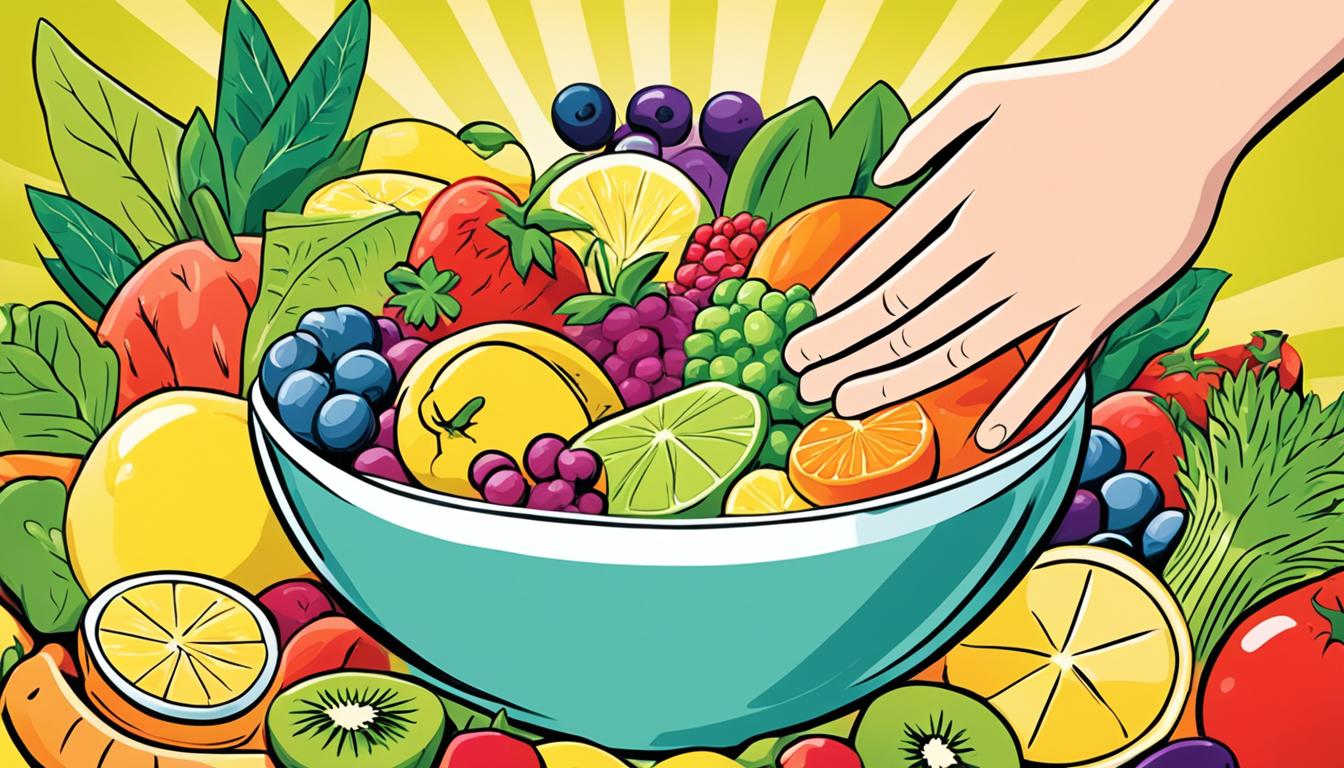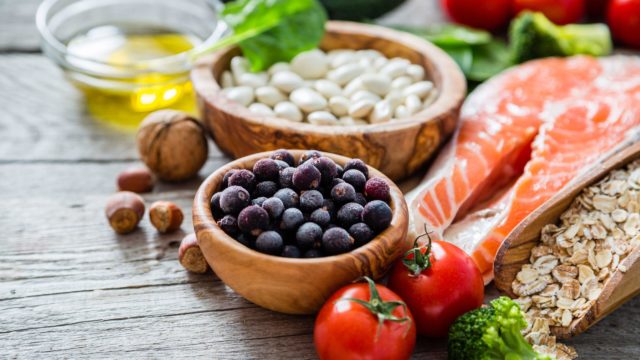FTC disclaimer: This post may contains affiliate links and we will be compensated if you click on a link and make a purchase.
Gout affects a whopping 8.3 million Americans, making it a common form of inflammatory arthritis. It causes sudden, intense joint pain due to the buildup of uric acid crystals. Although gout doesn’t have a cure, lifestyle changes, home remedies, and some treatments can help.
This guide will cover natural ways to ease gout pain. We will look at diet changes and soothing home remedies. With these strategies, you can take control of your gout and improve your life.
Key Takeaways
- Gout is a type of arthritis from too much uric acid
- Eating less high-purine foods can reduce gout symptoms
- Trying cherries, ginger, and lemon water might help with pain
- Things like stress, how much you drink, and hydration affect gout
- Doctors can give you medicine to help with gout pain
Understanding Gout: Causes and Symptoms
Gout is a type of arthritis caused by too much uric acid in our bodies. Uric acid comes from breaking down purines in some foods. This can form crystals that cause pain, swelling, and redness in our joints.
What is Gout?
Gout mainly affects the big toe’s base joint. Yet, it can happen in many other joints too. Its attack’s signs start suddenly, usually at night.
Causes of Gout
High uric acid leads to crystals in the joints, causing gout. Eating too much red meat and shellfish, drinking beer, and being overweight can raise uric acid levels. Men face gout more often than women, usually between 30 and 50 years old. Women’s risk grows after menopause.
A family history of gout or recent surgery can also trigger it.
Symptoms of a Gout Attack
A gout attack shows as sudden, strong pain, and the joint turns red, swells, and feels warm. The big toe is often the first joint affected. If not treated, gout can cause urate crystals to form under the skin or more attacks.
It can also cause kidney stones by letting uric crystals build up in the urinary tract.
“Gout is one of the most painful forms of arthritis, but it’s also one of the most treatable.” – Dr. Sarah Smith, Rheumatologist
Hydration: The Key to Gout Relief
Drinking enough water matters a lot for gout. More fluids can lower uric acid and make joints feel less swollen. Try to drink lots so you pee every two to three hours. This helps get rid of uric acid crystals. Some studies show this really helps manage gout.
Choose water to keep hydrated. Other good options are clear broths and herbal teas. But stay away from alcohol and sugary drinks. They make gout problems worse by upping your uric acid level. Wine is okay but not beer or hard liquors. They make gout risk go up.
- Aim to drink at least 8 glasses of water per day to keep your body well-hydrated.
- Try putting lemon or lime in your water for extra taste and help against gout.
- Green tea or nettle tea is good too. It helps keep you hydrated and fights inflammation.
Keeping hydrated is a great way to handle gout. It also cuts back on the chance of gout coming back. Making sure you drink plenty of water is a big first step to feel better naturally.

“Proper hydration is essential for flushing out uric acid and preventing gout attacks. Drink plenty of water and limit intake of beverages that can raise uric acid levels.”
Ice Therapy: Soothing Gout-Inflamed Joints
If you have a gout flare-up, using an ice pack can really help. It cools down the joint, easing both pain and swelling. For best results, always cover the ice pack with a light cloth or towel. Then, gently press it against the sore spot for around 20 minutes.
How to Apply Ice Packs
- Wrap an ice pack or other cold object in a thin towel or cloth.
- Gently place the wrapped ice pack on the affected joint.
- Leave the ice pack in place for 20 minutes.
- Repeat this process every few hours as needed during a gout flare-up.
Benefits of Cold Compresses
Cold compresses are also great for gout pain. They calm down the area and reduce how much it swells. Plus, they make you feel less pain. Using items that are cold or hot right on the gout spot does wonders for how you feel.
Gout Relief Technique | Description | Effectiveness |
|---|---|---|
Ice Packs | Wrapped in a thin towel or cloth, applied to the affected joint for 20 minutes | Reduces pain and swelling during a gout attack |
Cold Compresses | Applied to the swollen, painful joint | Helps alleviate discomfort and inflammation |
Adding cold therapy to your gout care makes a big difference. It gives you relief and helps better manage your gout over time.
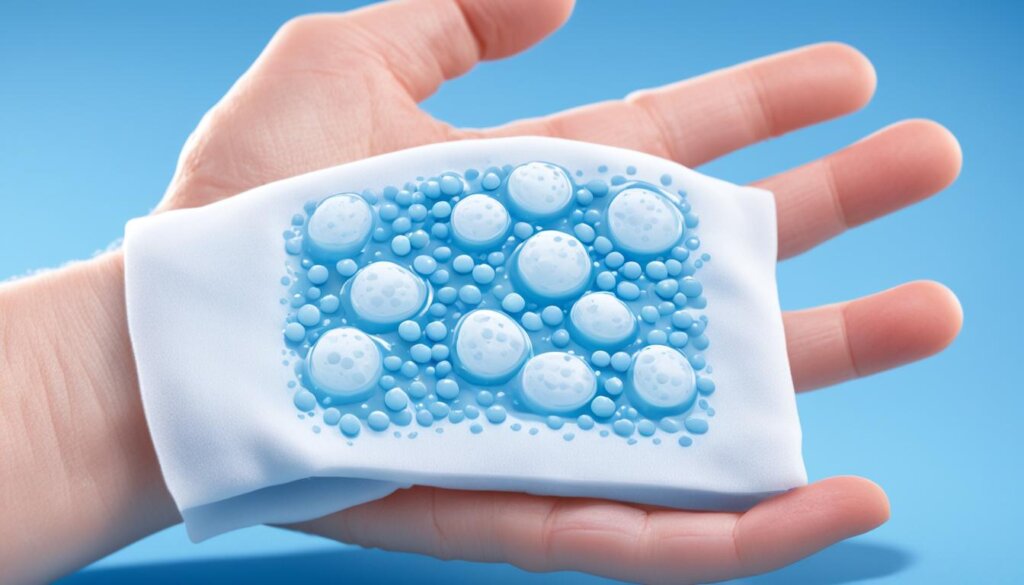
Stress Management for Gout Patients
Stress can make gout flare-ups worse. It’s hard to get rid of every stress in life. But, you can learn to manage stress. This will help ease your gout symptoms. Include relaxation tactics and adjust your lifestyle. You’ll see stress has less effect on your gout.
Stress and Gout: The Connection
Gout is affected by many things, including stress. Too much stress makes your body act differently. It can mess with the uric acid in your blood. This may cause crystals to form in your joints. The big toe is often the first place you feel it. So, learning to handle stress is key in managing gout.
Relaxation Techniques for Gout Relief
Add relaxation to your daily life to lessen stress and help with gout. Here are some ways to relax:
- Meditation: Mindfulness meditation is good for stress and might lower gout’s effects.
- Deep Breathing: Breathing deeply calms your body. It lowers stress.
- Yoga: Yoga moves may help your joints move better. They also could cut gout pain.
- Tai Chi: This slow-moving practice from China also helps with deep breathing. It’s good for stress in gout patients.
Find what relaxes you to beat stress with gout. Try out different ways and find what you like. Use it every day to feel your best and ease gout.

“Stress management is key for gout patients. By adding relaxation to your everyday, stress impacts less on your gout and you feel better all around.”
Dealing with stress is vital for gout care. When you manage stress, you’re doing a big favor for your gout. It’s hard but worth it for less gout pain and a better life.
Elevating Affected Joints: A Simple Remedy
Elevating the joints during a gout flare-up helps a lot. It lessens swelling and cuts down on inflammation. Blood and fluid flow away from the joint when you raise it up. This is good because it moves the discomfort away from you. Adding ice packs to the mix, known as RICE, will also help. This mix helps in easing gout symptoms.
- Find a comfy way to raise the sore joint. You can use pillows or a footrest.
- Keep the joint up for at least 30 minutes, many times a day. The more you do this, the better.
- Use a cold pack with the elevation. It’s a good way to fight pain and swelling.
Gout affects men more than women. It’s common in people in their middle ages and older. Postmenopausal women also have a higher chance of getting gout. By raising the sore joints and doing RICE, you can fight gout effects.

Next time, if you get a gout flare-up, raise the joint and use ice. It’s a simple but powerful trick. It helps ease the pain and swelling.
Over-the-Counter Pain Relief for Gout
If you have gout’s intense pain, OTC anti-inflammatory drugs can help. Ibuprofen (Advil) and naproxen sodium (Aleve) are good choices. They ease the pain and swelling caused by uric acid crystals in the joints.
NSAIDs work best when taken right as symptoms start, within 48 hours. But, it’s key to take them as directed. Don’t use NSAIDs for more than 7-10 days. Diclofenac gel, an OTC pain cream, might help too, but it’s not as strong.
Pairing OTC pain meds with ice, water, and rest can do wonders. This combo makes you feel better quicker. Remember, pain creams alone may not ease severe gout pain.
Be careful with certain drugs. Avoid low-dose aspirin as it can make gout worse. Always talk to your doctor before starting any new medicine.
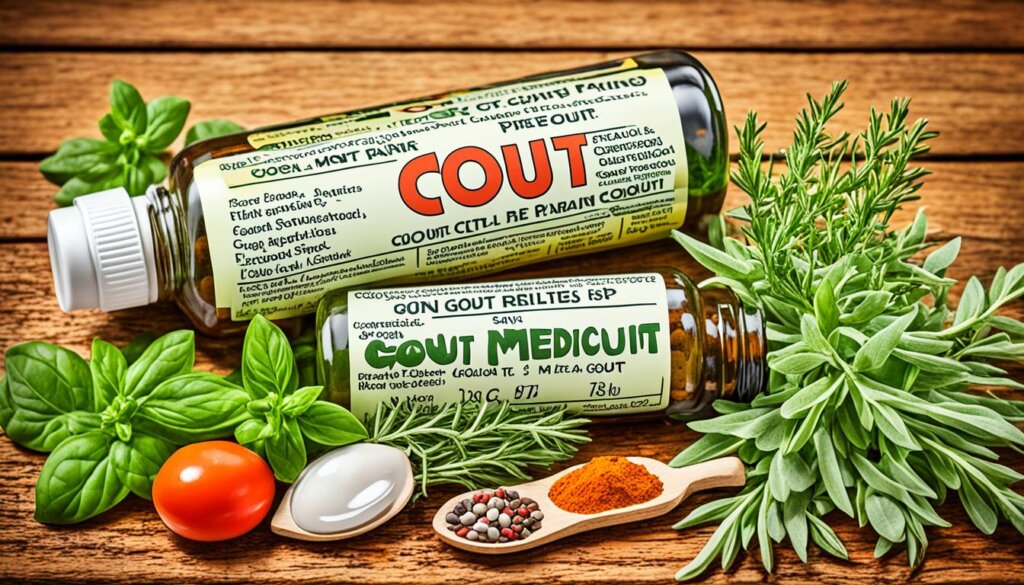
For gout, OTC pain meds are short-term help. Long-term, changing your diet and staying a healthy weight matter. Your doctor can help you make a plan for better living with gout.
Cherish Your Cup of Joe: Coffee and Gout
Love coffee? Here’s good news: drinking coffee might lower your risk of gout attacks. Studies found a link between higher coffee intake and gout risk decrease. It’s not clear how coffee works its magic, but it may lower uric acid levels.
Why is coffee good for gout? One reason is its diuretic nature. A diuretic pushes our bodies to remove more water. This includes flushing out uric acid, which can stop gout from developing.
But, not all coffee helps the same. Some kinds, like Lifeboost Pumpkin Spice Coffee, may do more for you. It costs between $28.95 and $34.95 for a 12 oz bag. And, you can get deals like 3 bags for $77.85 or 6 bags for $143.70. This coffee is specially made to be top-notch for both taste and quality, which could be great for managing gout.
Coffee can also have downsides. About 20% of people in the US get acid reflux, which coffee’s acidity can worsen. If you’re one of them, a little baking soda in your coffee can help balance the acidity out.
So, a cup of coffee each day might help with gout symptoms. Trying special kinds of coffee, like Lifeboost Pumpkin Spice Coffee, might give you an extra benefit. Always talk to your doctor before making big changes to your diet for gout reasons.

Dietary Adjustments for Gout Management
Changing your diet can help with gout a lot. Eating less high-purine foods and more low-purine foods can really make a difference. This approach helps in controlling gout and boosts health.
Low-Purine Diet for Gout
Gout patients should cut back on high-purine foods. These can lead to too much uric acid, causing gout attacks. So, it’s wise to eat less red meat, seafood, and alcohol, especially beer.
Adding low-purine foods to your diet is good. This group includes many fruits, veggies, and whole grains. Also, drinking plenty of water helps the body get rid of extra uric acid.
Importance of a Balanced Diet
It’s not just about avoiding high-purine foods. A balanced, nutrient-rich diet is key for gout. This diet should be full of essential vitamins and minerals from fresh, unprocessed foods.
Here are some good foods for people with gout:
- Go for leafy greens, beans, and tofu for protein
- Eat fatty fish like salmon sometimes
- Try tart cherries or their juice for less inflammation
- Eat foods with lots of vitamin C, like oranges and peppers
Adding these foods to your meals can really help those with gout. It’s about balancing your diet with the right foods. Doing this can mean better health and living with gout more comfortably.

Lemon Water: A Refreshing Gout Remedy
If you have gout, lemon water might be a great help. Studies say lemons are good at fighting gout pain.
Adding the juice of two lemons to 2 liters of water daily can lower uric acid levels. This helps prevent gout flare-ups. Lemon water is a simple, natural way to fight gout troubles.
Lemon water can also help in other ways. Drinking lemon juice every day for 6 weeks helped lower uric acid in adults. It even worked for mice in a different study.
Several studies have found lemon juice helps lower uric acid. This is whether you have gout or not. It changes the pH of your blood and may help prevent gout problems.
Studies are still looking into how much lemon juice is best for gout. Yet, lemon juice appears safe with no reported side effects. Around 30mL a day or juice from two lemons in 2 liters of water seems helpful.
Drinking lemon juice carefully can prevent issues like mouth or stomach irritation. Dilute and rinse your mouth after drinking it.
Lemon water can be part of a healthy gout management plan. But, do not rely only on lemon water. It’s important to treat gout and watch for other health problems.
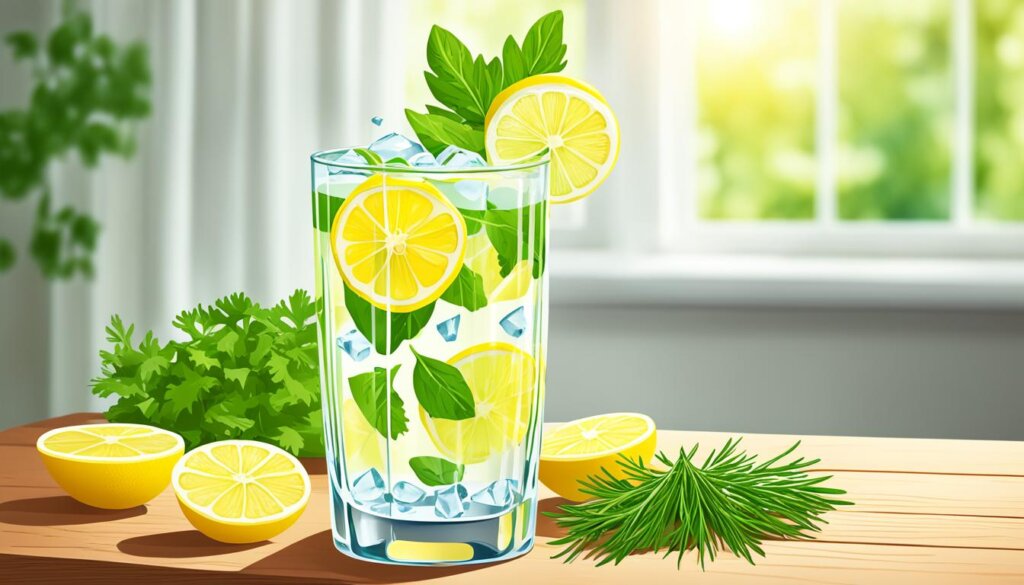
“Lemon juice helps balance uric acid levels by raising the pH level of blood and fluids.”
Alcohol Moderation: A Must for Gout Patients
Having gout means being careful with how much alcohol you drink. Heavy drinking can raise your chance of getting gout. Studies show that in men, the risk of gout goes up by 17.2% with more alcohol.
Beer has a lot of purines. These can make uric acid levels go up and start gout attacks. When you have gout, it’s best not to drink beer or any alcohol. This helps avoid making gout symptoms worse.
Wine doesn’t clearly raise gout risk like beer does. But it’s wise to cut back on all alcohol when you’re managing gout. For staying safe, women should keep to one drink a day. Men can have up to two drinks daily.
Keep alcohol use moderate if you have gout. Too much can cause other health problems like heart disease. It can also make gout harder to manage. Talk with your doctor about treating gout. This plan should look at your lifestyle and might include medicine.
Cutting down on alcohol is helpful, but not the only step. A holistic gout plan also includes eating less purine, keeping a good weight, and following the DASH diet.
“Alcohol, including wine, is high in purines which can lead to increased uric acid levels and trigger gout flares.”
Working closely with your healthcare team is important. By taking charge of your gout, life can get a lot better.
Other Home Remedies for Gout: Natural Alternatives
Many people look for natural ways to handle gout instead of just using medicine. Luckily, there are several home remedies helpful for gout. These can ease the pain and may even lower uric acid levels. Let’s dive into some of these methods.
Ginger: A Powerful Anti-Inflammatory
Ginger is known for fighting inflammation. It has properties that might help people with gout. Research shows ginger can reduce the uric acid in your blood. This might help with the pain and swelling from gout. Adding ginger to your meals or taking supplements might make a difference.
Apple Cider Vinegar and Turmeric: A Potent Combination
A mix of apple cider vinegar, lemon juice, and turmeric is another option. Apple cider vinegar has malic acid, which can lower uric acid levels. Turmeric’s curcumin can also reduce uric acid levels in the blood. Drinking this mix often could be a natural way to ease gout symptoms.
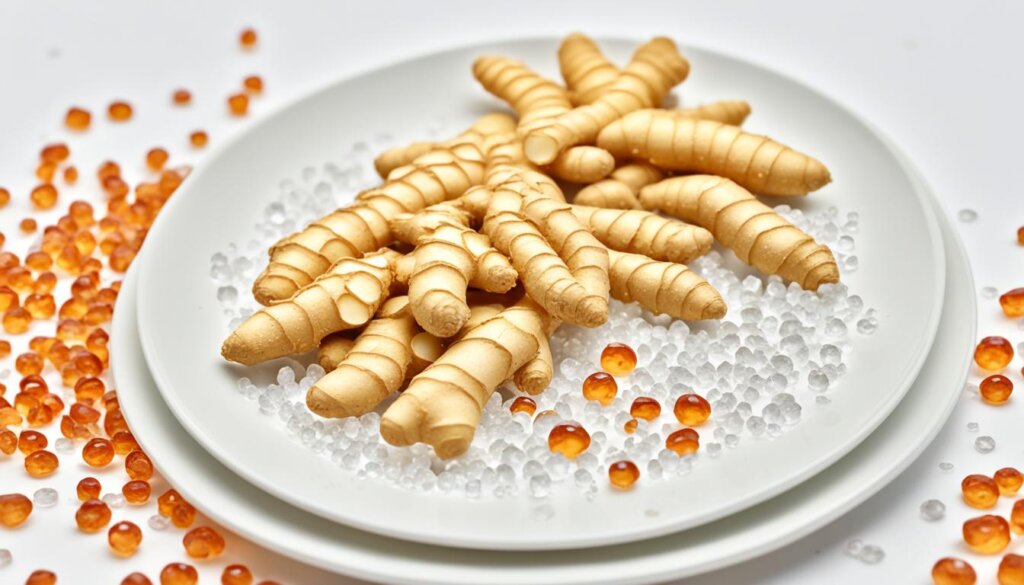
Research also shows cherries might be beneficial for gout. They could make gout attacks less often and reduce uric acid. Getting enough vitamin C and magnesium is important too. Not having enough of these nutrients might lead to higher uric acid levels and a greater chance of gout.
Remember, using natural ways is good but not the only solution. Always talk to your doctor when you have gout. Combining natural remedies with medical care is the best approach. This way, you can find a plan that works for you and keeps you healthy.
Gout-Friendly Herbs and Supplements
Looking for natural help with gout? Certain herbs and supplements show promise. Celery and celery seeds are great. The ancient aid of nettle tea is also good.
Celery and Celery Seeds
For centuries, celery and its seeds have been remedies for gout. They may lower swelling, though more proof is needed. Studies indicate that a celery extract with 60 mg of harpagoside may cut pain and medicine use in gout patients.
Nettle Tea: An Ancient Remedy
Nettle tea might also help gout sufferers. Nettles have anti-swelling properties. They might ease gout issues. Drinking burdock root tea could reduce swelling signs in those with a gout-like condition. Though more study is needed, nettle tea is a natural choice for gout care.
It’s smart to talk to your doctor before trying any herbs or supplements for gout. They might not mix well with your medications. A diet low in purines and plenty of water are vital parts of gout care.
Herbs and supplements can aid, but don’t rely on them alone. They should go hand-in-hand with your doctor’s advice.
“Incorporating gout-friendly herbs and supplements, along with lifestyle changes, can be a powerful natural approach to managing this painful condition.”
When to Seek Medical Attention
Gout causes severe pain in the joints and can be eased with home and professional care. Yet, urgent medical help is needed sometimes for a gout attack.
When severe symptoms appear, like extreme pain, swollen and red joints, and a high fever, call your doctor fast. These could mean a big issue, and quick help is vital to stop more joint harm and illnesses such as gouty arthritis.
If your symptoms don’t get better after 48 hours, it’s time to talk to your healthcare provider. They might change your medicine or suggest other ways to help.
Before your doctor’s visit, write down your symptoms and your health history. Also, list any medicines you take now. It’s great to have a friend or family member with you. They can remind you of important facts and ask questions.
Ask your doctor about your gout’s cause, needed tests, the best treatment, and medicine side effects. Also, ask when you should start feeling better. Acting fast and talking to a doctor can help you manage gout well and avoid future problems.
“Early treatment of a gout attack is crucial to prevent further joint damage and complications.” – Dr. Sarah Johnson, Rheumatologist
Diagnostic Tests for Gout | Purpose |
|---|---|
Joint fluid test | Identify uric acid crystals in the joint |
Blood test | Measure uric acid levels in the blood |
X-ray imaging | Detect joint damage and tophi formation |
Ultrasound | Visualize uric acid crystal deposits in the joints |
Dual-energy computerized tomography (DECT) | Precisely identify and quantify uric acid crystal deposits |
Keep in mind, a high blood uric acid result doesn’t always confirm gout because levels can vary. Checking the joint fluid is the sure way to say if it’s gout or not.
For managing gout well and preventing future issues, acting quickly and working with a doctor is key.
Surgical Options for Severe Gout Cases
In some severe gout cases, surgery might be needed when other methods fail. Surgery helps with conditions like chronic tophaceous gout. This happens when uric acid forms crystals under the skin, causing pain. Tophi removal, joint fusion, and joint replacement are common surgeries.
Tophi removal cuts out the uric acid deposits, lessening pain and swelling. Joint fusion makes bones stop moving. This reduces inflammation in small joints, often the hands. Joint replacement, especially the knee, can make moving easier and lower pain in damaged joints.
Doctors consider surgery only if everything else doesn’t work. Also, if someone with gout has surgery for another reason, their gout may get worse if their uric acid was high.
Surgical Option | Description |
|---|---|
Tophi Removal | Excision of uric acid deposits to alleviate pain and swelling |
Joint Fusion | Immobilization of bones to reduce inflammation in smaller joints |
Joint Replacement | Replacement of severely damaged joints, often the knee, to improve mobility and relieve pain |
Surgery might be the last choice for severe, hard-to-treat gout. But first, doctors try to help with lifestyle changes, medicine, and natural options. It’s key to see a doctor quickly and work with them to find the best plan for your health.
Conclusion
There is no cure for gout, but it can be managed well. A mix of medicines, home fixes, and lifestyle changes work together. They help keep gout under control and stop it from coming back.
It’s important to drink lots of water. Aim for 8-10 glasses every day. This helps remove extra uric acid from your body. Also, putting ice on the sore area for about 20 minutes can ease pain and swelling. And do your best to lower stress. All these steps can make a big difference for people with gout.
Eating the right foods is key. Adding lemon juice to your water can lower uric acid levels. Stay away from foods high in purines. This includes red meats, seafood, and alcohol. Instead, eat cherries. They help reduce uric acid and lessen gout attacks.
Keeping a healthy weight also matters a lot. So, make sure to exercise regularly. This is crucial because being overweight raises your gout risk a lot.
Try new home treatments too. Pulsed Electromagnetic Field (PEMF) therapy can be very beneficial. It breaks down uric acid crystals and boosts healing. Also, try to include low-fat dairy in your diet. It’s linked to a lower gout risk. These methods, when used together, allow people with gout to manage their symptoms. It can improve their daily lives a lot.
FAQ
What is gout and what causes it?
Gout is a type of arthritis. It happens when the body makes too much uric acid. This acid turns into crystals that can hurt the joints. It leads to swelling, pain, and redness.
What are the symptoms of a gout attack?
A gout attack brings on sudden, strong pain. The joint gets red, swollen, and warm. Most times, it starts in the big toe.
How can staying hydrated help with gout relief?
Drinking more fluids helps the kidneys work better. They remove extra water that causes swelling. Water is best, but clear soups and teas also work well.
How does ice therapy help with gout?
Ice helps with gout by lessening swelling. For 20 minutes, place a cold pack on the joint. Make sure it’s wrapped in a cloth.
How can managing stress help with gout?
Stress makes gout worse. To control it, get enough sleep and relax. This can include meditation, deep breaths, and doing fun things.
How does elevating the affected joint help with gout?
Elevating the joint can lessen swelling. It helps fluids move away from the joint. Along with ice, it’s part of RICE method for gout.
What over-the-counter medications can help with gout?
Drugs like ibuprofen and naproxen help with pain and swelling. Always follow the dose and ask your doctor about other medicines you’re taking.
How does coffee affect gout?
Drinking coffee has been linked to lower gout risk. It may help lower uric acid. We’re still learning how coffee works against gout.
What dietary changes can help manage gout?
For gout, a diet with low fat and carbs is good. Eat lots of fruits and veggies. But avoid foods high in purines like red meat and seafood.
How can lemon water help with gout?
Drinking lemon water daily can lower uric acid. In a 2015 study, it helped reduce gout flares. Lemon water cuts down on uric acid.
How does alcohol affect gout?
Too much alcohol can up your gout risk, especially beer. It’s because beer is rich in purines.
What other natural remedies can help with gout?
Ginger may cut gout pain and lower uric acid. A mix of apple cider vinegar, lemon, and turmeric might reduce uric acid too.
Traditional celery and celery seeds are thought to help. They may decrease joint soreness. Nettle tea could also be good due to its anti-inflammatory effects.
When should you seek medical attention for gout?
See a doctor if your pain and other symptoms get worse. Also, get help if it’s not better after 2 days. This is very important for your health.
What are the surgical options for severe gout cases?
In extreme gout cases, surgery might be needed. This could involve fixing or removing the joint. Surgery is a last resort after trying other treatments.
